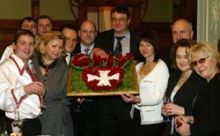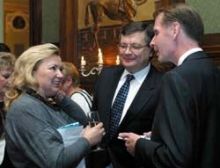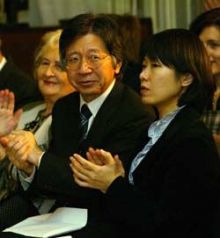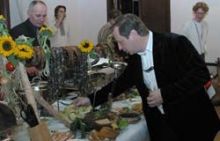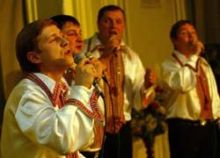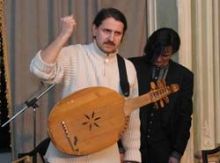On December 17 Kyiv’s chamber theater Suziria hosted the Volyn Soiree under the slogan “Vocal and Wine Glass.” Attending the event were our newspaper’s friends, partners and contributors, as well as representatives of the Volyn “diaspora” in Kyiv and guests from “mainland Volyn.”
It is Volyn National Lesia Ukrainka University and The Day that hit upon the idea of organizing this club-type party. Last year editor-in-chief larysa Ivshyna offered a certain journal her own recipe of the national idea as a New Year wish. Firstly, we should praise one another (publicly and privately) whenever there is an opportunity. Secondly, every decent Ukrainian who knows another decent Ukrainian should acquaint the latter with a third one (if they have not met before) for mutual interest and pleasure. And, thirdly, all of them should get together at a gorgeous table and feel how nice it is to live in a positive-oriented country. It happened exactly like this. The soiree was in fact an original presentation of Volyn University. This was continuation of our longtime cooperation with the university aimed at establishing and investing social capital. We have struck a friendly relationship with the Ostroh Academy, Dinipropetrovsk Mining University, as well as Zaporizhzhia, Odesa, Chernivtsi, and Cherkasy universities. But the year 2007 passed, so to speak, under the sign of Volyn University which is well known by many interesting initiatives. In particular, it comprises an institute that researches the oeuvre of Lesia Ukrainka. Incidentally, it is the first (and so far the only) research institute as part of a higher educational institution in Ukraine. The institute is going to publish a full 16-volume collection of the works of this poetess, political writer, and public figure. Volyn University is also in charge of Shatsky National Park.
It has even held an international conference on the problems and prospects of this gem of a park. It is now planned to hold it once in two years and invite representatives of the world’s well-known preserves. A 300-bed holiday camp is being built for this purpose. There will also be a tourist itinerary on Lake Svitiaz. “It is the same 400 kilometers from Lutsk to Kyiv, Warsaw and Vilnius. So it is obvious that European integration processes should go through Volyn University,” Rector Ihor Kotsan said half-seriously, half-jokingly.
It is in fact coming back to ancient Ukrainian traditions. Universities are becoming nuclei of the intellectual, cultural and spiritual life of the region and the entire country and play an important part in the making of a civil society. This is why cooperation and mutual support are indispensable now.
“Dear ladies and gentlemen! I am pleased to see the people I respect on the eve of a holiday that usually lasts for a month in Ukraine,” Larysa Ivshyna began. “One part of our assembly is Ukraine’s intellectual elite. Another is heavily represented by political ‘stars.’ Still another consists of representatives of the diplomatic corps. Besides, we also have here a part of Kyiv’s Volyn ‘diaspora.’ There are also guests from Greater Volyn, such as Petro Kraliuk, Pro-rector of the Ostroh Academy which in fact was the first university with which we established friendly ties. This only reinforced my opinion that Ukraine has one more great untapped potential. Also came here members of the Ostroh Club of Free Intellectual Youth Contacts - young people who ventured to get off their classroom desks and travel to other cities in order to speak with their peers about Ukrainian identity and the necessity of learning to live together in their beautiful country which we do not yet know very well. It is only now that Ukrainian universities are regaining their historic importance and are becoming, I would say, the engines of every region. The Volyn University story is a follows: this year it was granted national status. This is a high-profile event for the region. This again confirms the opinion that a university can tone up the entire space around itself. Once, after the defeat of Kyivan Rus, Volhynia took over and preserved Ukrainian identity. Nevertheless, the Volhynians never suffered from megalomania. They would come back to Kyiv with great love, as Ulas Samchuk, one of the 20th-century’s best prose writers, noted.”
It was the unique group Chorea Cosacca that sank the guests into the atmosphere of ancient Volhynia. “When asked what associations Volyn calls up in me, I say: a glorious and still unstudied history, the history of tolerance, cultural influences and, in the final analysis, the history of a powerful state, where democracy was a genuine value,” said the celebrated bandura player Taras Kompanichenko.
The group performed “God with Us,” a catchy 16th-century Ostroh tune (popular at the court of Prince Ostrozky), some songs with lyrics by Demian Nalyvaiko (incidentally, one of the first Ostroh Academy graduates), and a 17th-century exquisite banquet canto “Drink, Brothers, Drink” to the ovation and cries “Bravo!” And... questions. “Some of the works that you are performing were composed before the invention of notes. Where do you find and how do you decipher them?” Yevhen Marchuk asked. According to Kompanichenko, the musicians use little-known pieces published in Ukraine and Poland, as well as works that came out well before the revolution. Besides, they often work in the private archives of Ukraine and other countries and buy antiquities.
To beef up the Volyn theme, Volyn University’s male quartet Accord sang some insurgent and folk songs that are popular in their region. Then they added folk songs popular in Greater Ukraine. This was, so to speak, the embodiment of the first part of the slogan “Vokal i bokal” (“Vocal and Wineglass”). As for the wineglass, it is a pleasant accompaniment to the traditional Volyn cuisine and, what is more, it promotes communication.
The Day put the following question to the Volyn Soiree guests who, by the way, often contribute to our newspaper:
“How can we strengthen the role of universities and increase their weight in society?”
Ihor MITIUKOV, director-general, Institute of Financial Policies:
“It is a splendid idea to hold the presentation of Volyn University in the well-known chamber theater Suziria. I was a pleasant surprise for me to see so many well-known people with whom I previously worked, work now and I hope will be working and maintain contacts: they were born and raised in Volyn and graduated from Volyn oblast universities. The atmosphere is unrestrained. Obviously, the guests are having a pretty good time and some of them are rediscovering Volyn for themselves. A good combination of the pleasant with the useful.
“In my view, to increase the role and importance of universities, one must, firstly, limit their number and, secondly, up-to-date higher educational institutions should be given more freedom and funds.”
Iryna VANNIKOVA, spokesperson of the President of Ukraine:
“It is a very viable and extremely effective way to present a university. At least you will never forget it. At most, I’d like to visit Volyn University or, maybe, even send my children to study there.
“Hality in reality, very much depends on the curriculum and teaching methods of a higher educational institution. I graduated from the Kyiv Mohyla Academy. I must say that in 1996, when I was applying, it was quite a progressive institution, although it had existed for just three or four years. Incidentally, this was also the result of an effective promotional campaign and, undoubtedly, the curriculum and the teaching methods. The same applies to the Ostroh Academy. But as for other universities... In this case, the state, in particular the Ministry of Education and Science, should make efforts to modernize the curricula of the higher school as a whole.”
Vlasta SHOVKOVSKA, foreign relations manager, charitable foundation Development of Ukraine:
“I read with interest the book-cum-album My Universities. As a foreign relations manager, who often travels across the country, I must say that I’d like to follow the suit of Ms. Ivshyna. We (our charitable foundation and The Day) even planned to launch a joint campaign in Donetsk. Now I have seen the way a similar event could be organized in Donbas. For, in my opinion, we should take interest in one another, come to know each other, instead of turning in on ourselves. Then the world will finally be looking differently at our country.”
Sviatoslav KRAVCHUK, deputy chairman, Volyn Oblast Administration:
“I think everybody is aware today that we will be a third-rate state without any impact in the world unless we have modern universities that offer a quality education.
“Let us not forget that, beginning with Prince Sviatoslav’s times, Ukraine used to make breakthroughs in education: the Ostroh Bible, Pylyp Orlyk’s constitution... Besides, our people has always had the following trait: to seek an chance to give their children an education even in difficult times. It is part of our national character! Therefore, this will help us vary with and quickly respond to the challenges of today.”
Vsevolod LOSKUTOV, minister-counselor at the Embassy of the Russian Federation in Ukraine:
“First of all, sponsors and the state should give universities financial and organizational aid. There should be proper conditions for development and laying a more progressive and modern groundwork for academic and research work. For universities are scholarly, liberal arts and medical centers. It is also important that students live in proper social conditions. Their recreation and living conditions should be duly organized. Therefore, what is needed is concrete help and modernization of the teaching process because the word is changing. There is some interesting experience in both Ukraine and Russia, and I think it is very important for the two countries to exchange experience.
“As for the correlation between state-run and private universities, this depends on the possibilities of every country. But one must note that far from all can afford to study at private universities. It is also important that the quality of specialist training in state universities be not worse than at private institutions.”
Reinhard SCHAEFERS, Ambassador Extraordinary and Plenipotentiary of the Federal Republic of Germany to Ukraine:
“It is difficult to say something offhand about increasing the role of Ukrainian universities. I must think a little. In Germany, for example, most universities are state-run: they are funded by land governments. The main particularity of our federal system is that universities depend on the regions. I think Ukraine can follow this suit. Besides, some of the funds come from the central government in Berlin. There also are private universities in Germany, but it is an occasional occurrence because they do not play any important role. This kind of universities usually cater to a certain sector. For example, there are elitist universities in the economic sector, but they are small and unable to compete with state-run ones.”
Mutsuo MABUCHI, Ambassador Extraordinary and Plenipotentiary of Japan to Ukraine:
“I think Ukrainian students are very industrious and diligent.
“And how to increase the role of universities? I think it is important that university students should feel that they are taking part in the building of a nation. Each of them should know that he or she is part of the important state-building work. If students are inclined to behave so and have this kind of motivation, then I think the overall attitude will improve and they will focus on studying. Then the studies will promote the construction of Ukraine’s future.
“I believe that state-run universities play a very important role. At the same time, private universities can also do very much. It is necessary that state-run and private universities coexist. I therefore think that Ukraine needs both state-run and private universities.”
Vira ULIANCHENKO, head of the Kyiv Oblast Administration:
“We were growing up at a time when universities played quite an important role. For example, it was a pipe dream for me enter Kyiv University. Besides, universities were strongly supported by the state at the time. And I must say that educational institutions were giving multifaceted knowledge. Obviously, the state should increase its role today in supporting the higher school. I think that, in comparison with graduates in other countries, ours are more adaptable to real life but, at the same time, they are less oriented, so to speak, to the future because universities need a serious improvement. I have also an impression that we become shy when we find ourselves in the university environment of any country. But the knowledge that our students receive is much more profound that a foreign university curriculum can provide. So on should feel more uninhibited, for we still have a complex that all that is foreign is better.”
Kostiantyn HRYSHCHENKO, former minister of foreign affairs of Ukraine:
“The Volyn University presentation is very interesting. One can see the culture of Volyn and its traditions of hospitality. All this gives one a true picture of the Volyn land. I think the region and the state as a whole will only benefit from this. Every area has its own unique history. And it is impossible to build a successful society without a university which, being based on Ukrainian traditions of education, should be the center of a region’s cultural and intellectual life. This is the essence of a regional-level project.
“The world knows a lot of instances of progress in the communities totally separated from the elites. In other words, the elite was either disappointed with those values or was simply displaced from that society by force of external factors. Take, for example, Quebec in Canada. Once 10,000 French-speaking Quebecois remained under the jurisdiction of Britain which, incidentally, was not as civilized as it is now. They were not allowed to have their own higher educational institutions. In other words, they were not allowed to have what keeps the spirit alive. But in the 1920s-1930s and especially in the 1960s, the main regions of this province founded universities. And now the Quebeckers are among the most educated people of the world. It is a proud part of big Canada. We can well do the same in our country.”
Stanislav KULCHYTSKY, deputy director, Institute of the History of Ukraine:
“In my view, the reform of universities should go hand in hand with that of the National Academy of Sciences of Ukraine. It is not accidental that in the West the scholars who have already made a contribution to research also have what to say to students. This is why the quality of education is higher over there. There are institutions in the West, whose graduates later become Nobel Prize winners. Unfortunately, we don’t have Nobel laureates. Why? There are a lot of reasons.
“The main reason is that our youth does not receive a proper training. Many universities have been granted national status. I think it was a wrong step because it is still necessary to have elitist educational institutions. Besides, as we have entered a market economy, it is important that universities work in it. This does not mean that tuition fees will go up steeply. Instead, universities will be establishing their own funds. When we deal with American and Canadian universities, we see that the situation is paradoxical. They have unused funds, while we have brilliant brains which we cannot persuade to remain behind in the research sector. Therefore, to raise the role of universities, we need a comprehensive reform of university education.”
Ihor SMESHKO, president, civic association Center of Strategic Studies and Analysis:
“This presentation is an eloquent example for this country’s universities. I would day like this: if people like Ms. Ivshyna could be found in every oblast, we would be able to make progress in restoring our national dignity and respect for our history and culture.
“I think the Ukrainian higher school badly needs support at the highest governmental level. What is more, this support is possible even in the current financial situation of the state. We should not economize on culture and science. Ukraine has every resource to make the ministries of culture and education the richest ministries. All we have to do is show a political will and a right governmental action.”
Vasyl KREMEN, ex-minister of education and science of Ukraine, full member of the National Academy of Sciences of Ukraine:
“I am convinced that the importance of education in general and of universities in particular grows with the progress of humanity. It is clearly evident today because we are moving towards a society of knowledge. A society of knowledge means not only new information flows, sophisticated computers and information exchange items but, above all, the human being who is capable of living and working on the basis of knowledge. But we cannot raise a knowledgeable person without a modern school and university. And these institutions should essentially change their performance if they are to become effective and increase their role. To be educated means today to have knowledge as a set of methods and a basis for behavior in life. Universities and schools should restructure their work in such a way that knowledge should be the focal point of a human life, not just a material to be passed at an exam. This is the No.1 thing. Secondly, humanity is entering the innovative type of progress, when ideas, technologies and expertise change faster than one generation replaces another. One cannot receive knowledge for the rest oh his lifetime even at a traditional, even the best, school or university. So schools and universities are facing the problem of teaching an individual to receive lifelong knowledge. We should form a nation that would learn continuously. Only on this basis can we shape a modern Ukrainian nation, not an excessively conservative and orthodox one, which we, unfortunately, show very often.”
Yevhen MARCHUK, former prime minister and former minister of defense of Ukraine:
“I think that the evolution of governmental and international life will be raising a demand for well- educated and highly professional people with every passing year. Today any serious company is not just looking if one has higher education and what educational institution he or she graduated from: it looks whether the specialist is a graduate of a highly-reputed university or academy. I think that the demand itself will induce highly professional staff into the labor market. But very much also depends here on the standards set in society by the topmost officials, such as the president, the prime minister, the Verkhovna Rada speaker, and chairmen of the Constitutional Court and the Supreme Court. Also of importance are influential people who do not hold offices but are a moral, political or scholarly authority in society. There is so much criticism leveled on the topmost officials, which they deserve. But I am sure that just a few political cycles later the topmost offices will not be held by people who do not nave command of the official language or cannot write grammatically. Topmost governmental officials should be subjected to a testing of sorts in two or three universities. Take, for example, the presidential elections. It is impossible to write in any law or constitution that each of the presidential candidates must appear, for example, before the students of Volyn National University, the Osroh or Kyiv Mohyla Academy. But it would be good if students could examine every candidate. This means that the president, as the head of state, no matter who he is and what political party he represents, should know the subject “The State and the Law” and the history (real, not bookish) of his state. The head of state should also know, at least minimally, a foreign language — first of all, English. There often occur situations (I used to get into some when I was the prime minister) when heads of state meet without the press and interpreters. But knowing languages is still exotic for us. The head of state is commander-in-chief of Ukraine’s armed forces, which means that he should know at least the minimum of what concerns managing an army. This kind of examinations should become a tradition. If one has failed a student-like jocular and, at the same time, serious attestation, he is at a moral disadvantage as a candidate for the presidency. Incidentally, I suggested introducing such examinations back in 1999, but nobody supported my initiative. I am sure that a half of the candidates, if not more, would have stood down. In other words, the state can introduce many things in its laws, but very much also depends on new traditions. Naturally, statesmen will be showing initiative here, but universities can well throw them sort of a challenge. I think that, in the course of time, if not this then some other initiative like this will emerge.”
Viktor NABRUSKO, head of the National Radio Company of Ukraine:
“The educational sector is very polyphonic today. There are cities, where students account for 25-30 percent of the population. On the one hand, this is a gladdening factor, but there is also another, very essential, side that concerns, among other things, journalism (I feel it very well): the professional level of staff training. Therefore, the university should be the flagship that will identify a high professional level and the degree of public demand.
The higher educational institutions that society needs will be prestigious. So the main task is that every university curriculum should include a certain special course, a certain nicety. This will gradually raise the level of universities. We have colossal traditions, but we should not put ourselves into mothballs but, instead, adapt to world standards, with due account of national interests.”
Valentyna RUDENKO, advisor to the President of Ukraine:
“Unfortunately, our country has seen a transition from the Soviet period to a totally unpredictable and unstable time - obviously to the detriment of public values. But the time is coming up, when we are returning to genuine values, including a quality education. We can see young people who are eager to study: they strive to get a second education. In my opinion, students should travel to other universities in order to know and communicate with one another more closely, as is practiced all over the world. Incidentally, Larysa Ivshyna is showing a good example in this case.
“As for the just completed event, it was kind of a culture shock for me. I liked very much that there were students here, the university rector, a superb university quartet, and well- known Ukrainian and foreign dignitaries. Such things should occur more often. In other words, we should launch a nice tradition, when every region organizes this kind of soirees because traditions is a very important component of our life.”
Inna NOVAK, associate professor, Diplomatic Academy of the Ministry of Foreign Affairs of Ukraine; director, International Center of Protocol and Etiquette:
“It was a very interesting and successful presentation. I have heard very much from Ms. Ivshyna about the Ostroh Academy and Volyn University. I can only say that it is a rewarding thing to pin hopes on young people. It is, so to speak, a rationally placed investment, an investment in the future.
“As for universities, their role can be strengthened by out-of-ordinary personalities who will manage these institutions and restore old Ukrainian traditions. Naturally, the state should also cooperate with socially-oriented business.”
Mykola ZHULYNSKY, full member of the National Academy of Sciences of Ukraime:
“I am convinced that the level of university education and the autonomy of universities is the best indicator of a society’s spiritual condition. Therefore, Ukrainian universities should go through quite a fast process of self-determination as centers of free thinking, formation of the intellectual elite, civic activity, and responsibility. I think very serious steps in this direction have been taken today. We have excellent universities as far as inner climate and atmosphere is concerned. I think these institutions have already accumulated the worldwide and national experience of establishing universities that meet the crucial requirements of a modernized Ukrainian society. The point is not so much in that we must integrate into the world educational space as in that we need to make ourselves a name in the world. This will only be possible if education, science, culture, and the nation’s intellectual potential are a top priority for us. Very much also depends on the way we will perceive universities. We are aware that Ukraine will be unable to develop as a modern state without this. I think we have very optimistic prospects for this. At first, we should opt for independent testing and thus root out corruption in universities.”
Olha HERASYMIUK, TV hostess, member of parliament and the Our Ukraine party:
“Universities have always been the most valuable educational centers, even in very troubled times. Larysa Ivshyna’s philosophy today is that we should pay more attention to educational institutions. I also visit universities and see that they accumulate our future. And students really inspire a hope that a new generation, new thinking and new viewpoints will eventually effect changes. And no troubles will stop this. We have some universities today, which we can be proud of, such as Kyiv Mohyla Academy, Ostroh Academy, and Volyn University. I think these universities still keep many real things, including research. For they are linked with the world. Suffice it to look at the Ostroh library. But in reality we still have many problems to tackle. First of all, we should reform the system of education because what has been going on here in the last while was politics pure and simple. We are now on the threshold of changes, but we are talking too much instead of taking a step. It is the Volyn Soiree that instilled hope in me because it is not students who came to the capital, it is the capital’s scholarly elite that came to them.”
Lilia PUSTOVIT, fashion designer:
“I have known Taras Kompanichenko for a long time, but I was for the first time that I heard him as part of the Chorea Cosacca. As a person who meditates and is able to perceive vibrations and energy, I immediately felt that the group possesses a very strong and positive aura. The boys’ faces seem to have come from some Ukrainian pictures or icons. They are very handsome and irradiate unusual holiness and spirituality. You just receive a tremendous charge of energy and spirituality in a few minutes of their performance. For example, I immediately thought about cooperation with a DJ who could set this music to modern beat, still keeping some traditional points intact. It is necessary that people hear the Chorea Cosacca’s music. I will perhaps make a show to this kind of modernized old music. One must do every day the things that concern the awakening of energy and spirituality in an individual. I am grateful to Ms. Ivshyna for taking care of this.
“Education is something without which a country cannot exist as such. After all, there should be places that train the young people who will be leading our nation in the future. Naturally, only universities can give the country people of this kind. I am very pleased to hear that the boys now studying at Eton want to return later to Ukraine and engage in social politics to develop Ukraine. It is also very important that our universities provide a high-level education and that a time should come when the British could come to study here - at Volyn and Kyiv universities or the Ostroh Academy. This in fact depends on each of us, as does everything in this country.”
Ihor YUKHNOVSKY, director, Ukrainian Institute of National Memory:
“I am Volyn born and raised, as is my wife: I am from near Berestechko and she from Plyzhny. Even for this reason, I felt pleased at this soiree. When I looked at all the beautiful women sitting in this hall, I thought that they all seem to have almost the same faces - round, straight, with well-open and superb eyes. I think this is very typical of Volyn women. Naturally, I am delighted with Volyn University which was granted national status and with its good rector. But I am still more glad that they all have such a great protector and popularizer of their talents and skills as the newspaper Day. I wish The Day would be still more closely tied with Volyn, I wish all the newspaper’s staff, and especially Larysa Ivshyna, a sound Volyn-type health.
“A long time ago, when Japan lost the war, the emperor said in a speech that he did not know what to do exactly, so he suggested developing science. And the country was developing in this vein. And if you ask why Ukraine obtained independence now and not, for example, in 1918, I will say only because we have now our own Ukrainian engineers, mathematicians, physicists, biologists, and linguists. Volyn had a basis owing to which Ukraine could become independent. And this also applies to every other part of Ukraine.
“Volyn University should be Volyn’s sole educational center because it conducts a particular research into Ukraine. The university has Shatsky lakes, unique natural lakes with unique water and landscape. Conserving and exploring this nature is a major task for this university. It also has Lesia Ukrainka, which is also a task for the university. There have always been good mathematicians and physicists here. I think Volyn University will take pride in this, too. In a word, Volyn University should be the pivotal point of Volyn.”
Valentyna PAVLENKO, assistant director of the Ukrainian service, Radio Liberty:
“This is not quite usual but a very interesting variety of presentation. Obviously, everyone felt himself a real Ukrainian after this soiree. This feeling sprang up from the inside of my self. I come from Cherkasy oblast, but I am still happy that I have Volyn. If only the Cherkasy region could show itself like this!
“I was thinking about the role of universities when I visited the Ostroh Academy and met its Rector Ihor Pasichnyk and Pro-rector Petro Kraliuk. What nice and wise people devoted to their cause! Ukrainian universities will only be able to influence the formation of a civil society in Ukraine if they are run by people of the Pasichnyk and Briukhovetsky caliber. You know, when I look at the ‘elite’ that sits in the Verkhovna Rada, a wave of desperation comes over me. The impression is it is the end. But when you see Kyiv Mohyla, Ostroh Academy, and perhaps Volyn University students, you understand it is the future elite.”
Olha RESHETYLOVA, member of the Ostroh Club of Free Intellectual Youth Contacts, Ostroh Academy graduate:
“ The Day’s Volyn soiree not only left a lot of positive impressions but also prompted me to draw some unexpected conclusions. First of all, the Kyiv community badly needs simple Ukrainian contacts, with songs, the Ukrainian language, a gorgeous table, and arguments about which region of Ukraine id the most hospitable one. And this fact is to some extent terrible. We never tire to speak about a rift between the regions, but in reality the problem is different: Kyiv, as the main (if not the only) unifying center, is culturally and socially far from the regions. Hence, in my opinion, the problems of a discord between the governmental policy and the requirements of the provinces, absence of necessary continuous links between the regional elites, etc.
“Another conclusion is that in a modern market-economy society every Ukrainian region, its traditions, achievements and outstanding figures need a well-considered promotional campaign (no matter how hackneyed the phrase is). The Volyn residents showed a nice example of how one can, using such an informational event as granting Volyn University national status, remind the world about their inimitable traditions and the importance of Greater Volyn in the history and the present day of Ukraine. Once representatives of every region begin to work on the positive image of their homeland, the problem of Ukrainian unity will cease to exist.”
Ivan KAPSAMUN, member of the Ostroh Club of Free Intellectual Youth Contacts, Odesa Univwersity student:
“I would call the Volyn Soiree an idea that can rally people together. Visiting this event, I, for example, felt as if I were in my home town of Budzhak. I am an ethnic Gagauz, and we, like all Turkic peoples, wherever we live or are, always show such a feature as cohesion — this is why the event called up this association in me. The artists who sang and played music seemed to be taking be back to our past, into Ukrainian history. I am asking myself if this cohesion can be an example for the entire Ukraine. Of course, it can! Ukrainian multiplicity is our wealth which should be utilized for the development and prosperity of the whole country. We should emphasize what unites, not disunites, us. In general, I am very grateful to The Day and personally Larysa Ivshyna for the invitation and for giving an ordinary Odesa University student a chance to attend this feast.”
Petro KRALIUK, Pro-rector, Ostroh Academy:
“The soiree was good because it properly presented Volyn, a region that did and is still doing so much for Ukraine to be Ukrainian. The Ukrainians do not know much about Volyn, they know more about the Cossack-glory Dnipro-side regions. Yet they rarely mention that Zaporozhain Sich was founded by the Volhynia-born Dmytro Vyshnevetsky. They more often recall Galicia, the ‘Ukrainian Piedmont,’ and the industrial regions of the east. But is it pure chance that it was Volyn that gave Ukraine its first presidents — Mykhailo Hrushevsky, who was born in Kholm, a part of Volyn in ethnographic and cultural terms, and Leonid Kravchuk? Is it pure chance that Volyn saw Ukraine’s first highly educated family? I mean the Kosach family that gave us Lesia Ukrainka. This is not the end of the list of ‘Volyn’s achievements.’
“The soiree’s organizers, Larysa Ivshyna and Volyn University guests, managed to create an atmosphere when all tho

